Key takeaways:
- Family conflicts often arise from differing expectations and unfulfilled emotional needs, highlighting the importance of understanding and addressing underlying feelings.
- Effective communication is crucial for resolving disputes, as it creates a safe space for sharing thoughts and preventing small misunderstandings from escalating.
- Setting clear boundaries and practicing compromise can foster healthier family interactions and help manage conflicts constructively.
- Seeking professional help can provide fresh perspectives and effective communication tools, leading to deeper understanding and improved family dynamics.
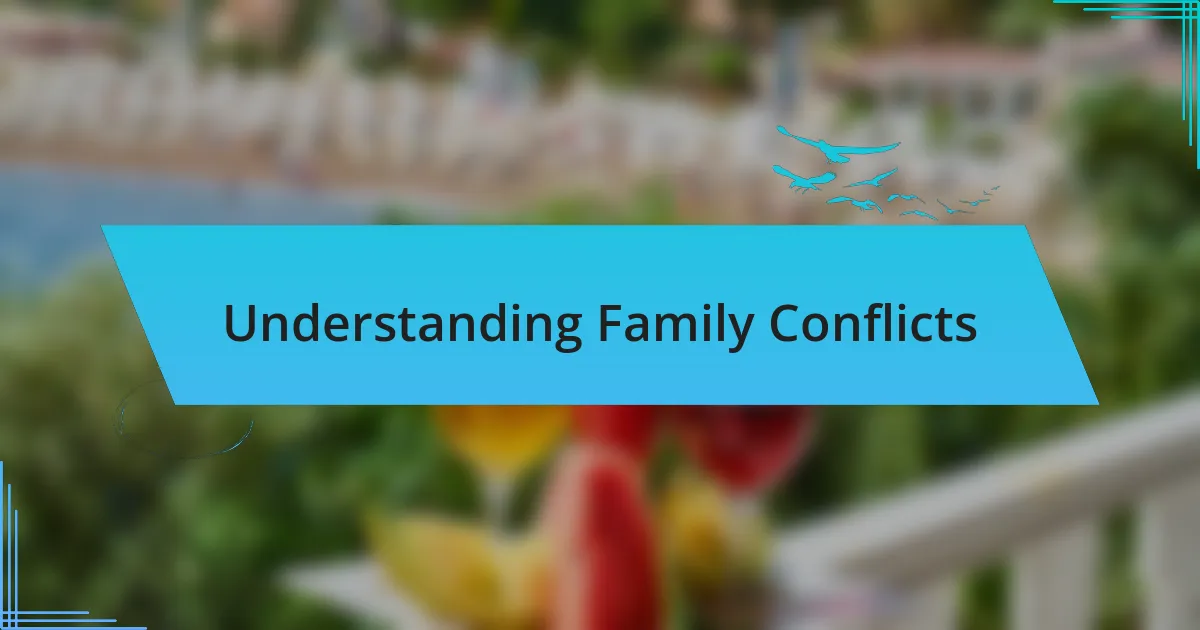
Understanding Family Conflicts
Family conflicts often stem from a mix of differing perspectives, expectations, and emotional needs. I remember a time when a seemingly small disagreement about vacation plans escalated into a heated exchange, simply because we all had different ideas of what “fun” meant. It left me wondering how easily misunderstandings could spiral out of control when underlying feelings aren’t addressed.
When I reflect on family dynamics, it becomes clear that emotions often play a central role in conflicts. Have you ever noticed how a disagreement can quickly morph into a clash of feelings rather than just ideas? In my experience, recognizing the emotional undertones of a conversation can be the key to navigating disputes. For example, I’ve learned to pause and ask, “What’s truly bothering you?”—and that simple question can often diffuse tension.
Understanding the root causes of family conflicts is essential for resolution. Sometimes, it’s not about the topic at hand but rather unfulfilled needs for validation or support. In one situation, a disagreement over chores revealed deeper feelings of being unappreciated. This taught me that beneath the surface of conflicts lies the need for open communication, where everyone’s voice is heard and valued.
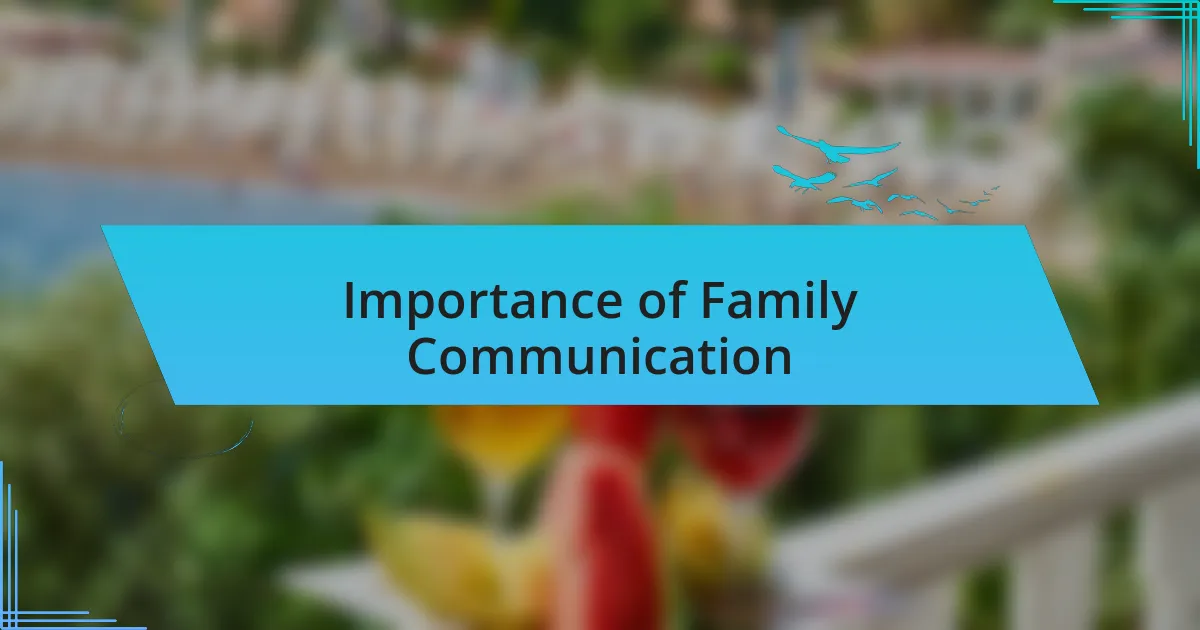
Importance of Family Communication
Family communication serves as the backbone of healthy relationships. I once found myself in a situation where a simple misunderstanding about dinner plans led to hurt feelings. Had we just taken a moment to discuss our preferences openly, we could have avoided a tense evening filled with silence.
I believe that effective communication strengthens family bonds. Think about it: when we share our thoughts and feelings, we create a safe space for vulnerability. I remember a family gathering where we decided to hold a “family check-in,” where everyone could express what was on their mind. That act of sharing not only cleared the air but also brought us significantly closer together.
Furthermore, communicating openly can prevent small issues from ballooning into larger conflicts. I learned this firsthand when my sibling and I disagreed about how to handle a family event. Instead of letting it fester, we scheduled a time to talk it through, and I realized that my sibling’s views were shaped by their own experiences—something I hadn’t considered. Embracing this understanding helped us reach a compromise and ultimately made our family gatherings more enjoyable.
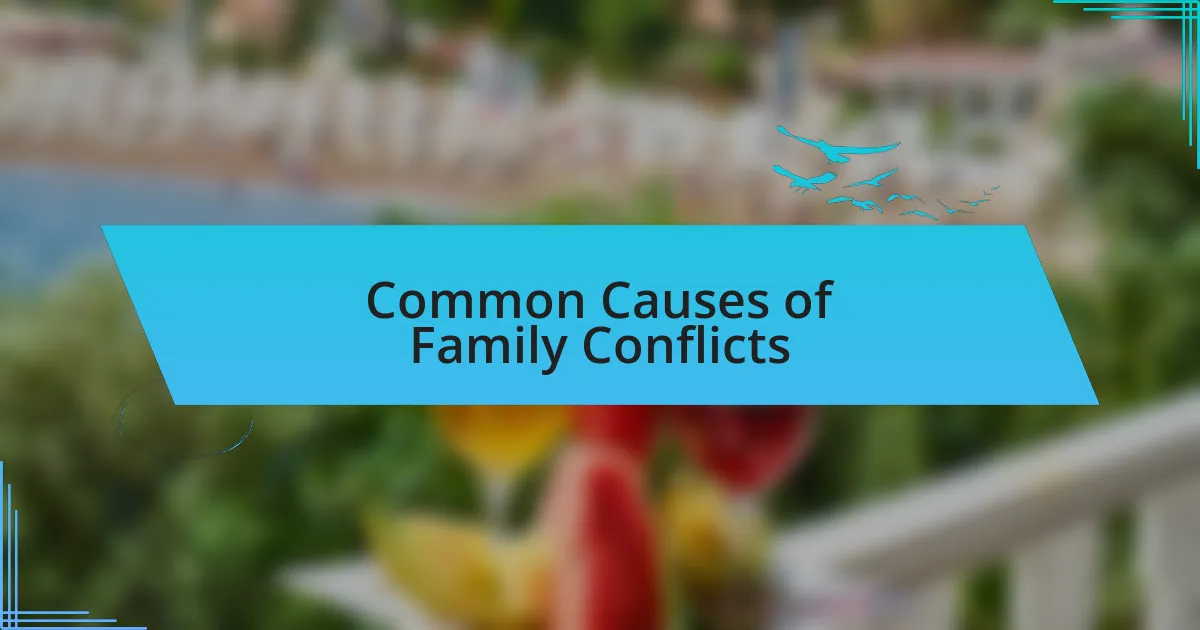
Common Causes of Family Conflicts
Family conflicts often stem from differing expectations and responsibilities. I can recall a time when my siblings and I clashed over who would take care of our aging parents. Each of us believed we were either pulling more weight or being unfairly burdened, which created tension. It made me realize how crucial it is to clarify roles and tasks early on, rather than letting resentment build beneath the surface.
Another common cause is the influence of external stressors. There was a family vacation I planned that turned into a battlefield due to work pressures and personal issues that none of us had shared. I noticed how the stress from outside our family bubble spilled into our interactions, making even small decisions feel monumental. Reflecting on this, I understand that acknowledging external stress can help us support one another better, instead of allowing it to fuel disagreements.
Additionally, differences in parenting styles often lead to conflict, especially in blended families. I’ve seen a friend struggle to find common ground with their partner on how to discipline their children. Their differing approaches led to heated arguments and confusion among the kids. This experience taught me that discussing parenting philosophies upfront can be a game changer in preventing conflict and fostering a more cohesive family environment.
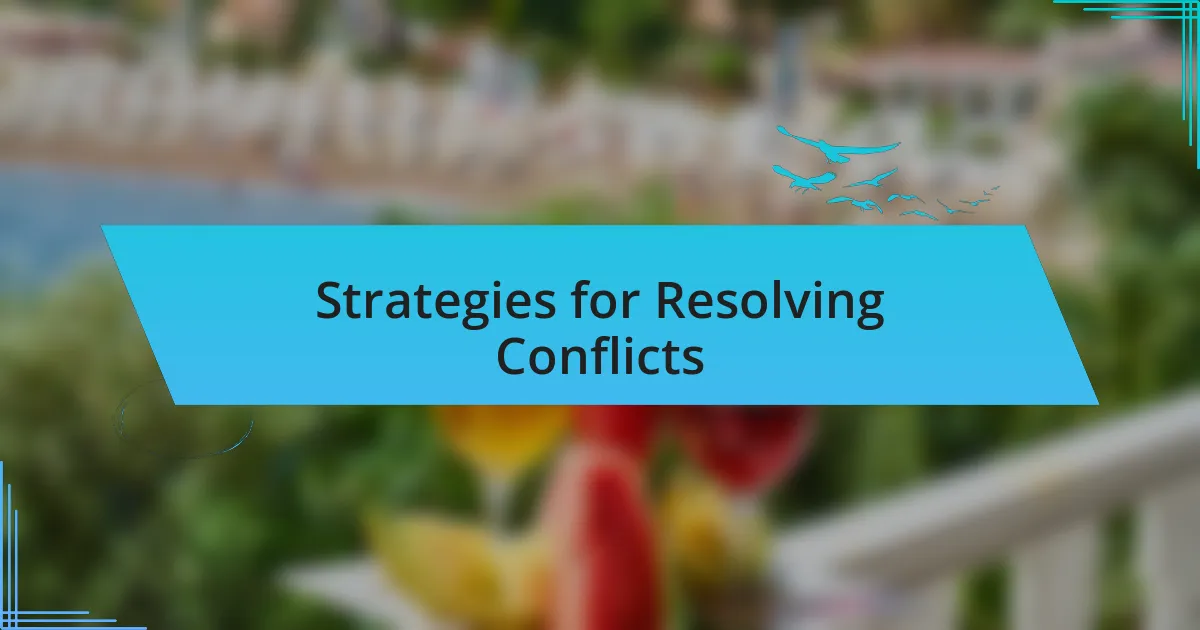
Strategies for Resolving Conflicts
One effective strategy I’ve found in resolving family conflicts is the power of open communication. I remember a tense evening after a family get-together when misunderstandings erupted over comments that were never intended to hurt. Sitting down with everyone, we shared our feelings and clarified our perspectives. It became evident how much clarity can defuse a situation, transforming the atmosphere from defensive to collaborative. Have you ever taken a moment to just listen? Sometimes, it’s all you need to mend a rift.
In my experience, setting boundaries is essential for healthy interactions. I once had to establish clear guidelines about topics we could discuss during family gatherings—no politics, for example. This simple shift created a more enjoyable environment and alleviated unnecessary tensions. It makes me think about the importance of knowing our limits. What boundaries have you established that could protect your family’s harmony?
Lastly, I advocate for the practice of compromise, especially when emotions run high. I recall a situation when two family members were at odds over vacation plans, each adamant about their vision. Encouraging a brainstorming session allowed us to pick elements from both ideas, resulting in a trip that everyone was excited about. Reflecting on that moment, I see that compromise isn’t about losing; it’s about gaining understanding. Isn’t it more rewarding to find a solution that brings joy to everyone?
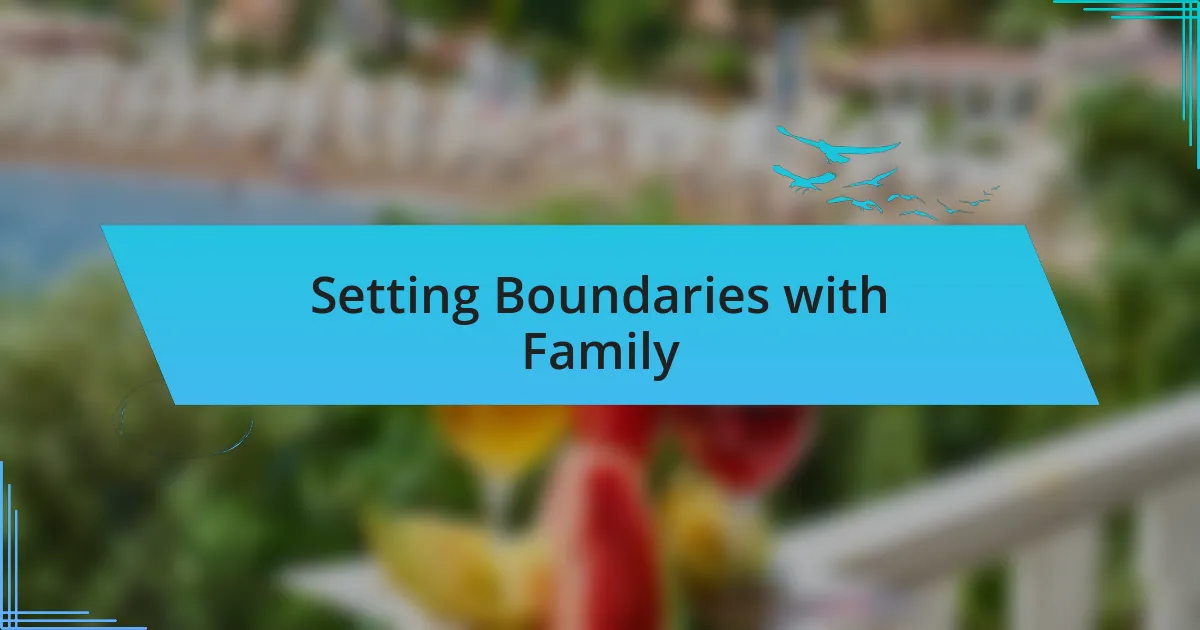
Setting Boundaries with Family
Setting boundaries with family can be a delicate process, but it’s crucial for maintaining peace. I remember the first time I had to assert my needs during family gatherings. It felt awkward initially, but once I expressed my discomfort about certain dynamics—like constant interruptions during conversations—I noticed a significant improvement. Have you ever felt unheard in your own home? Establishing a simple rule, such as allowing each person a chance to speak without interruption, transformed our interactions.
Reflecting on my experiences, I’ve learned that stating clear boundaries can actually foster deeper connections. One holiday, I decided to not only set limits on topics but also on how long we would discuss sensitive areas. This honesty encouraged others to express their thoughts without feeling overwhelmed. Isn’t it comforting to know that by simply being straightforward, you can create a safe space for your loved ones?
Moreover, I find that boundaries aren’t a sign of separation but rather a way to show respect for each other’s feelings. In a recent family discussion about where to go on vacation, I suggested we take a vote to determine preferences rather than pushing a single agenda. This approach helped everyone feel valued and included. How often do you think people overlook the power of mutual respect when trying to resolve conflicts?

Seeking Professional Help
Seeking professional help can be a game changer when family conflicts become too complicated to navigate alone. I once found myself in a prolonged disagreement with my siblings that felt like it was spiraling out of control. After much deliberation, we decided to seek a family therapist. This decision led to breakthroughs I hadn’t imagined possible, as a neutral party helped us communicate more effectively and explore underlying issues. Have you ever considered how a fresh perspective might shift your understanding of a conflict?
In another instance, our therapist encouraged us to engage in guided discussions, which allowed us to voice feelings we often bottled up. I shared how their teasing sometimes hurt my feelings, and to my surprise, others followed suit with their own concerns. Watching our family dynamics shift from defensive to constructive was deeply rewarding. Have you experienced moments of vulnerability that brought you closer together?
Sometimes, professional guidance provides tools that foster accountability and growth in relationships. I believe it’s important to follow up on what we learn in therapy. After our sessions, I made a point to check in with family members regularly, creating an open communication channel. This small shift has not only deepened our connections but also empowered us to resolve future disagreements swiftly. Isn’t it fascinating how a little encouragement can lead to lasting change?